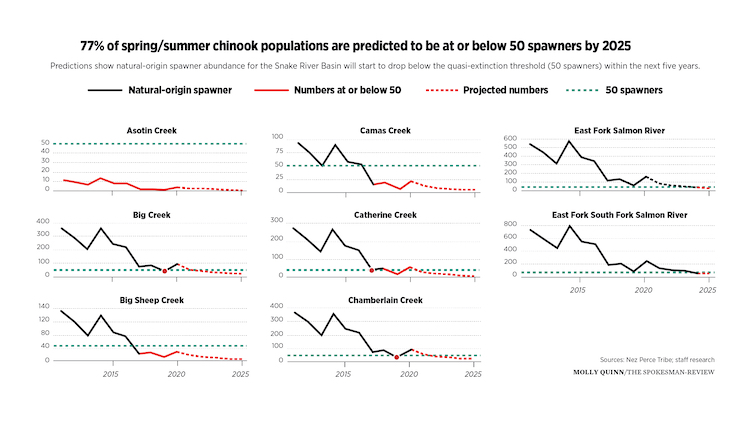forum
library
tutorial
contact

Simpson and Tribe
Talk Dam Removal
by Eric Barker
Lewiston Tribune, February 17, 2022
|
the film forum library tutorial contact |

|
Simpson and Tribe
by Eric Barker
|
Idaho representative provides update on his efforts to save wild Snake River salmon
 Idaho Rep. Mike Simpson said Wednesday that his effort to save wild Snake River salmon by breaching the four lower Snake River dams is alive and well despite not being included in federal infrastructure legislation.
Idaho Rep. Mike Simpson said Wednesday that his effort to save wild Snake River salmon by breaching the four lower Snake River dams is alive and well despite not being included in federal infrastructure legislation.
The conservative Republican representing Idaho's 2nd Congressional District spoke at a salmon-orca webinar hosted by the Nez Perce Tribe and said when his concept centered on dam removal and mitigation for affected communities and industries was released a year ago, he viewed the Biden administration's infrastructure push as a timely vehicle.
But the $33.5 billion idea, known as the Columbia Basin Initiative, failed to win quick support from the administration and other members of the Pacific Northwest's congressional delegation and was not included in the Infrastructure Investment and Jobs Act. Some, like fellow Republicans Cathy McMorris Rodges of Washington's 5th Congressional District and Rep. Dan Newhouse of Washington's 4th District, lambasted Simpson for the plan and said the dams are critical infrastructure needed to produce affordable and reliable power and help farmers get the crops to market.
Despite the blowback, Simpson said he continues to talk to people about the idea and believes it is gaining traction and will eventually become law. He urged listeners to do the same.
"These are what are called, in baseball terms, the dog days of August," he said. "It's long, hard work but the long, hard work prepares you to win the champ in October."
Wild salmon and steelhead that return to Idaho and parts of eastern Washington and northeastern Oregon have been protected under the Endangered Species Act since the 1990s.
The tribe has supported dam removal for more than 20 years and was an early backer of Simpson's plan. Nez Perce leaders rallied support from other tribes in the Pacific Northwest and across the country. Last July, the tribe hosted the Salmon and Orca Conference near Shelton, Wash., and continues to play host to a monthly speaker series on the topic.
Wednesday's edition, "No Fishing Without Fish," focused on the treaties most tribe's in the Pacific Northwest signed with the federal government in the mid-19th century that reserved their rights to fish for salmon and steelhead.
"Those fishing rights don't mean a whole lot if there is no fish," said Simpson. "Especially if the fishing is declining because of actions we have taken."
Erik Holt, chairman of the Nez Perce Tribe's Fish and Wildlife Commission, spoke about some of the federal actions that have diminished fish runs, including construction of the vast system of both hydro-electric and flood control projects. He specifically mentioned the Dalles Dam that smothered Celilo Falls -- a traditional fishing site for several Columbia River Tribes -- and Dworshak Dam that blocked salmon and steelhead spawning habitat on the North Fork of the Clearwater River.
Holt also talked about the Nez Perce Tribe's work to restore salmon and protect their fishing rights. In 1980, tribal anglers and the state of Idaho had a tense standoff at Rapid River. The state attempted to enforce a fishing closure on tribal members because of low fish numbers. Tribal anglers protested and took to the river with their dip nets to defend the fishing rights and honor their traditions. Holt, just a 10-year-old boy at the time, watched as his grandfather along with many other tribal members were arrested during the dramatic incident. He was scared and cried.
"Sonny, don't cry. One day you will remember why I'm going to jail," Holt said, quoting his grandfather.
"I remember now why he went to jail," said Holt. "He was fighting for our rights."
In the 1990s, the tribe reintroduced coho salmon to the Clearwater River. That run now provides tribal and nontribal fishing opportunities. Most recently, the tribe brought attention to the several populations of wild spring chinook in the Salmon River that have trended dangerously toward extinction over the past several years.
"We want a free-flowing (lower Snake River) and we will do our part to keep up with Mr. Simpson," Holt said.
That work, according to Holt, will bring benefits not just to the tribe but to others who cherish the fish and rely on the economic activity the runs can generate when they are healthy.
"Our treaties and what we do with them is for the betterment of all."
Aaron Lieberman, executive director of the Idaho Outfitters and Guides Association said members of his organization and their customers have suffered economically and culturally by the loss of fishing opportunities as runs have declined. He said 80% of the state's outfitters and guides live in small communities with populations of 500 or fewer people. When fish runs are healthy, places like Riggins, Salmon, Challis, Kooskia and Kamiah benefit. When the fish are absent, the communities lose out on important income and an activity that makes rural Idaho an attractive place to live.
Lieberman believes the region and the country are capable of coming up with a solution to remove the dams, save the fish, find other ways for farmers to get their crops to market, and produce affordable and reliable energy.
"We can do big things. We can do hard things," he said. "We can move mountains."
learn more on topics covered in the film
see the video
read the script
learn the songs
discussion forum
